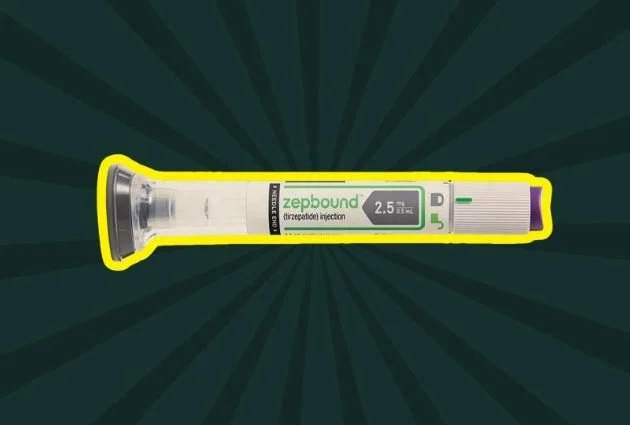What you need to know about new weight loss drugs
Over the last year, a wave of new weight loss drugs hit the market, including the recently approved Zepbound. While it might seem like these drugs cropped up overnight, this class of medications has been evolving over the last decade.
Here’s everything you need to know about the promise—and potential perils—of the next generation of weight loss drugs.
What are the new weight loss drugs, and how do they work?
In 2014, the FDA approved a type 2 diabetes drug called Saxenda to treat obesity. The medication was the first in a class of drugs called GLP-1 receptor agonists to be approved specifically for weight loss. GLP-1 receptor agonists mimic the hormone GLP-1, which the gut produces to signal to the pancreas, stomach, and brain to regulate blood sugar levels, reduce hunger, and increase the feeling of fullness.
In clinical trials, GLP-1 drugs resulted in significantly higher weight loss—up to 20 percent of participants’ body weight—than prior medications or diet and exercise alone. Notably, clinical trials for GLP-1 medications included people with obesity (a BMI of 30 or higher) or a BMI of at least 27 in addition to other weight-related conditions, such as type 2 diabetes or high cholesterol. (These drugs are not designed or recommended for small weight loss and have not been tested for efficacy or safety in people with lower BMIs.)
There are currently three FDA-approved GLP-1 medications on the market for weight management: Wegovy (semaglutide), Saxenda (liraglutide), and Zepbound (tirzepatide). Several other drugs with one of these three active ingredients, including Ozempic, are approved for type 2 diabetes but are used off-label for weight management.
Studies indicate that while many patients who remained on GLP-1 medications maintained their weight loss for up to two years, those who went off the medication regained the weight.
Currently, all GLP-1 drugs approved for weight loss require daily or weekly injections, but several oral versions are in development. The semaglutide pill Rybelsus is expected to be considered for FDA approval for weight loss in 2024. Additionally, several oral GLP-1 drugs are in clinical trials, including orforglipron, which launched a Phase 3 trial in June 2023.
What’s behind the popularity of new weight loss drugs?
Although Saxenda was approved for weight loss in 2014, it was the FDA’s approval of the more effective Wegovy in 2021 that sparked the drugs’ skyrocketing popularity. A recent analysis found a 300 percent increase in GLP-1 drug prescriptions between 2020 and 2022.
Intense ad campaigns and promotion by celebrities and influencers contributed to a Wegovy shortage and increased public interest. A July 2023 survey found that nearly half of American adults are interested in weight loss drugs, and, by one projection, over 15 million Americans will take the medications by the end of the decade.
Despite their popularity, the high cost of GLP-1 drugs makes them inaccessible to uninsured and low-income populations, including those most affected by obesity. (The medications can cost as much as $1,400 a month without insurance.)
What do we know about the drugs’ safety?
Existing GLP-1 medications are considered generally safe, with gastrointestinal issues like nausea, diarrhea, and vomiting being the most common side effects. Other side effects include headaches, dizziness, elevated heart rate, and pain or itchiness at the injection site.
Rarely, the medications can cause severe gastrointestinal and digestive side effects like pancreatitis, bowel obstruction, stomach paralysis, and gallbladder disease. However, research on the long-term safety of the drugs for weight management is limited.
And although animal research suggests a potential link between the GLP-1 drugs and an increased risk of thyroid cancer, it’s unknown if the same risk exists in humans.
How can I find accurate information about weight loss drugs?
Your health care provider is the best source for accurate information about weight loss treatments.
Social media, medical forums, and other online spaces can be a minefield of misleading health information and scams.
Many people first learned about Ozempic and other GLP-1 drugs from social media users sharing their stories, typically in videos that rack up millions of views. While these videos provide insight into the individual experiences of those taking the drugs for weight loss, they may also contain inaccurate information about how the drugs work and who should take them.
Additionally, some influencers receive payment and discounts for referrals to drug marketers without disclosing their financial relationship.
The growing interest in weight loss drugs paired with global supply shortages have created the perfect environment for an influx of unproven “alternatives” and fakes. For example, the supplement berberine has been promoted as “nature’s Ozempic,” while laxatives are being touted as cheaper alternatives to GLP-1 drugs.
Fake weight loss drugs have become so pervasive that the U.S. Department of Homeland Security has joined European and international law enforcement agencies to investigate the counterfeits.
This article first appeared on Public Good News and is republished here under a Creative Commons license.

